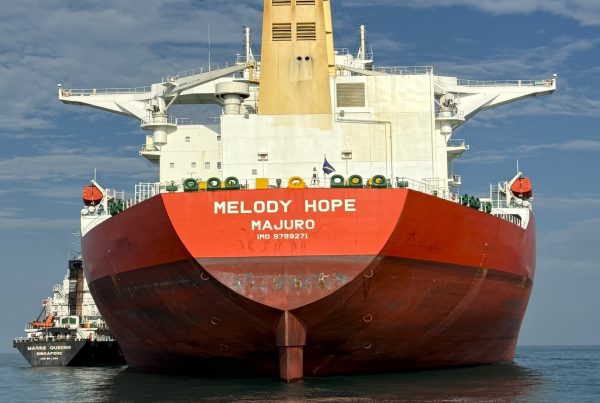In an unexpectedly lenient move, the US announced last week that sanctions against companies trading in Venezuelan oil will be dropped. This provides an opportunity for a reshuffling of oil movements, particularly in the Atlantic basin, and with that comes a renewed focus on VLCC employment and impacts on the ‘dark fleet’.
As its sanctions are removed, Venezuela can produce and export its oil freely. Discounts on the price of its crude will likely disappear, turning a significant amount of oil away from the dark trade and into mainstream markets. The sanctions are not lifted indefinitely, however. There is currently a time limit of six months in place on the sanctions relief to ensure that the Venezuelan government lives up to its end of the bargain to allow free and fair elections next year.
The oil sector in Venezuela has been heavily impacted by the sanctions, which have been in place since 2019. Oil production has dropped from highs of 2.5 million barrels per day to current levels of around just 800,000 barrels per day. The sector has suffered from years of under-investment and mismanagement, and any production ramp-up is unlikely to be quick. Forecasting agencies anticipate a limited recovery in oil production, but most agree that we will see a significant change to the flows from Venezuela.
We have seen around 400,000 barrels per day of seaborne crude and condensate flows from Venezuela this year. Just over half of these barrels are lifted on VLCCs, albeit with a portion of this marked as estimated liftings, as much of this happens on dark or grey vessels that are not all trackable via AIS. The Tankers International fixture data counts 5-6 liftings from Venezuela per month this year, most performed on dark fleet vessels with an average age of 18.3 years. Much of the sanctioned crude has been going to China, where teapot refineries have benefitted from the price-discounted supply. The recent easing of the sanctions has seen some supply head to the US and a small amount go to Spain.
As full sanctions relief is implemented, more Venezuelan crude is expected to flow to the US and Europe, with many US refineries built specifically to run on Venezuelan molecules. This could replace current US imports from the Middle East. However, the volume on that trade has not been substantial to the tonne-mile equation through 2023, and the VLCC segment accounts for roughly 3 liftings per month. The increased flow of crude from Venezuela to the US and Europe will boost demand for the Suezmax and Aframax segments.
A more significant impact on the VLCC market will come from current Venezuelan crude receivers having to find alternative supplies. Smaller Chinese independent refineries will lose access to cheap Venezuelan oil and may attempt to increase purchases of discounted Iranian and Russian barrels. As this is already a saturated market, supplies from Brazil and Colombia will likely satisfy any shortfall. This is a positive side effect, as the trade route from Brazil to China is predominantly a VLCC route.
A further implication will be that the trade route reshuffle will mean a return to the mainstream tanker fleet to lift the crude. The US and Europe will not welcome dark fleet vessels, and the same is the case for any additional VLCC loadings in Colombia and Brazil. A VLCC roundtrip from Brazil to China takes around 95 days to complete, so each additional monthly lifting on this route would employ 3 VLCCs full time. This means that if the current 5-6 monthly cargoes from Venezuela to China shift to load on mainstream VLCCs from Brazil, it will add demand for 15-18 mainstream vessels. This shows the potential scale of the impact of moving these oil flows into the conventional tanker market.
As Venezuelan sanctions are lifted for the first time in nearly 5 years, the market will be impacted in new and multiple ways. To stay informed on the latest market insight and data, download our app here: https://app.tankersinternational.com/









